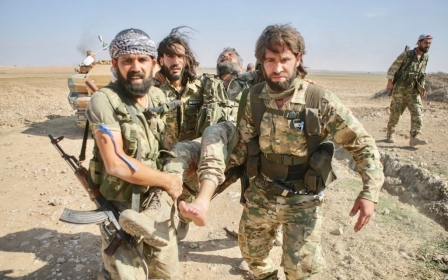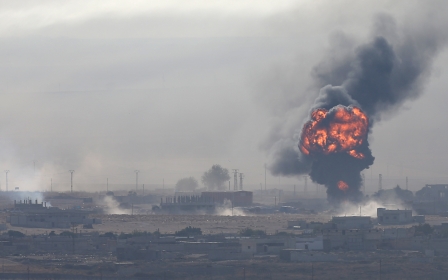France, Germany halt arms exports to Turkey over Syria invasion

France and Germany on Saturday suspended arms exports to Turkey over its offensive into Syria against Kurdish fighters, as protesters denounced Ankara at rallies in several European cities.
Turkish soldiers on Wednesday launched a cross-border assault against Kurdish fighters which Turkey sees as terrorists, in defiance of international criticism and threats of sanctions.
In a joint statement from the defence and foreign ministries, France said it had suspended all planned exports of "war materials" to Turkey that could be used in their offensive into Syria, AFP reported.
The Paris statement came hours after Germany, one of Turkey's main arms suppliers, also said it had suspended exports.
Stay informed with MEE's newsletters
Sign up to get the latest alerts, insights and analysis, starting with Turkey Unpacked
A number of countries have condemned Turkey's offensive, and Finland, Norway and the Netherlands have already announced that they are stopping arms exports to the country.
A meeting in Luxembourg on Monday of the European Union's foreign affairs committee will decide on a coordinated European approach to the issue, a French statement said.
It noted France's "firm condemnation of the unilateral offensive engaged by Turkey in the northeast of Syria".
Both the French and German statements on Saturday warned that the offensive may have serious humanitarian consequences.
Germany will not issue any new permits for any military equipment that could be used in Syria by Turkey, Foreign Minister Heiko Maas was cited as saying in the Sunday edition of Bild newspaper.
Reuters noted that Germany exported arms worth 243 million euros ($268m) to Turkey in 2018, accounting for almost one-third of its weapons exports, according to Bild.
In the first four months of 2019, Turkey received weapons from Germany worth 184 million euros, making it the biggest recipient country, the paper said.
Defence Minister Annegret Kramp-Karrenbauer said on Friday that Germany expected all NATO partners - which includes Turkey - to contribute towards stabilising the region.
Responding to Germany's announcement, Turkey's Foreign Minister Mevlut Cavusoglu told Germany's Deutsche Welle radio that it was "a question of national security, a question of survival".
Any arms embargo will only strengthen Turkey’s resolve, he added.
"Even if our allies support the terrorist organisation, even if we are alone, even if an embargo is imposed, whatever they do, our struggle is directed against the terrorist organisation," he said, referring to the Kurdish People's Protection Units (YPG).
The YPG has been the backbone of the Kurdish-led Syrian Democratic Forces (SDF) who were the main partner on the ground in the US-led campaign against the Islamic State (IS) group.
Ankara considers the YPG a "terrorist" offshoot of Kurdish rebels who have been fighting an insurgency against the Turkish state for three decades.
Thousands of people marched in several European countries on Saturday to protest the Turkish assault and condemn US President Donald Trump for having abandoned the Kurds as a key ally.
The SDF lost 11,000 fighters in the protracted US-led campaign against IS before finally overrunning IS’s self-proclaimed "caliphate" in March.
Middle East Eye delivers independent and unrivalled coverage and analysis of the Middle East, North Africa and beyond. To learn more about republishing this content and the associated fees, please fill out this form. More about MEE can be found here.





